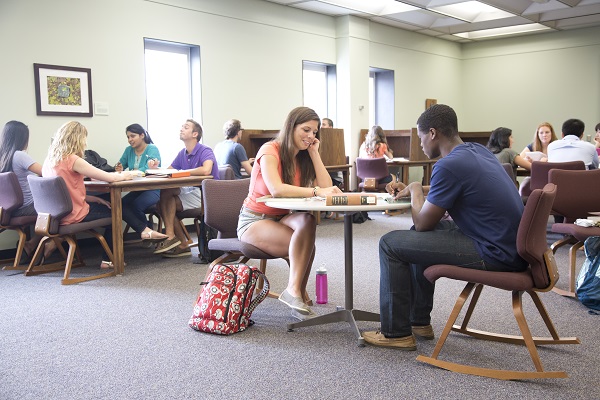University Libraries

Digging Deeper with Dialogue
By Rachel Barnett
Tensions continue to erupt into violent outbursts around the country. The recent events in Charlottesville demonstrate how intolerance can destroy the pillars of our democratic society as individuals were injured merely for exercising their right to voice their opinions through protest. Many of the rights we now enjoy were the result of peaceable protests and demonstrations in this country. We must protect the right for groups to advocate for social change peaceably as we learn better ways to engage different views and perspectives.
University of Dayton President Eric Spina has called upon us to live our Marianist values as we advance justice, foster civil discourse, and respectfully listen to others with different viewpoints. Our Marianist charism drives us to have faith that is thoughtful, active, growing, and engaging in both heart and mind. We must reject hate, racism, bigotry, and violence as we repair the broken bonds of our common humanity. Our sense of community compels us to empower our brothers and sisters as we try to heal and build a stronger society.
We must seek to build community across differences as we try to better understand others. Roesch Library has a variety of resources to help foster dialogue around current events and critical issues in society.
Race continues to be a divisive subject and we must learn ways of better understanding how it has influenced our past as well as our present. Jim Crow's Legacy traces the lasting impact of segregation on the lives of African Americans who lived through it as well as those that continue to be impacted by it. I am Not Your Negro is the vision of filmmaker Raoul Peck who imagined the completion of James Baldwin's unfinished book that documents the assassination of three of his close friends: Medgar Evers, Malcolm X, and Martin Luther King, Jr. It also connects the past Civil Rights movement to the present #BlackLivesMatter movement as it challenges the very foundations upon which the United States stands. Beyond Redistribution as well as America's Urban Crisis and the Advent of Color-Blind Politics discuss the history of race relations and its implications for social and criminal justice in the United States. Blackballed: The Black and White Politics of Race on America's Campuses provides a critical look at the prevalence of racism on college campuses.
Beyond understanding critical issues such as race, we must build communication skills that expand our understanding of other perspectives. Dialogue Across Difference, The Handbook of Conflict Resolution: Theory and Practice and Facilitating Intergroup Dialogues are all great resources that include techniques to create open, intergroup dialogues as you engage across social groups and build empathy and understanding,
As Michelle Obama said: "Right now, when we're hearing so much disturbing and hateful rhetoric, it is so important to remember that our diversity has been - and always will be - our greatest source of strength and pride here in the United States." Let's rely on our sources of strength in these trying times. The library can help you find resources. Please do not hesitate to reach out.
- Rachel Barnett is the evening access services specialist and chair of the Libraries' diversity and inclusion committee
